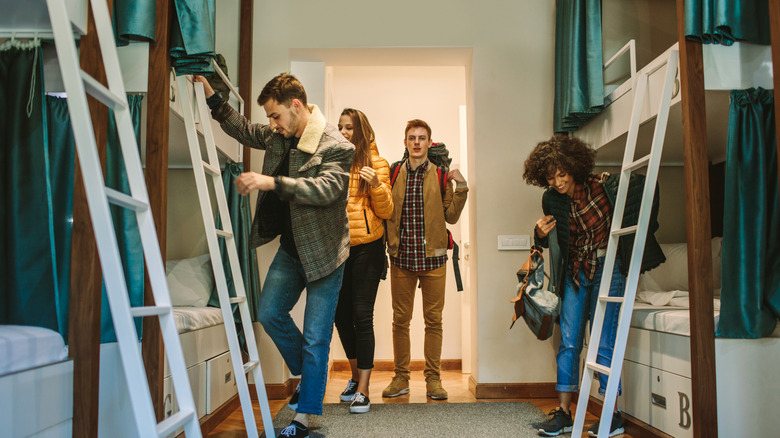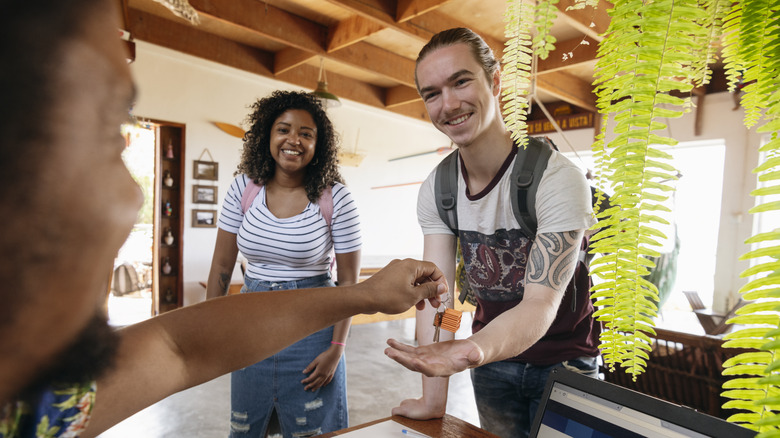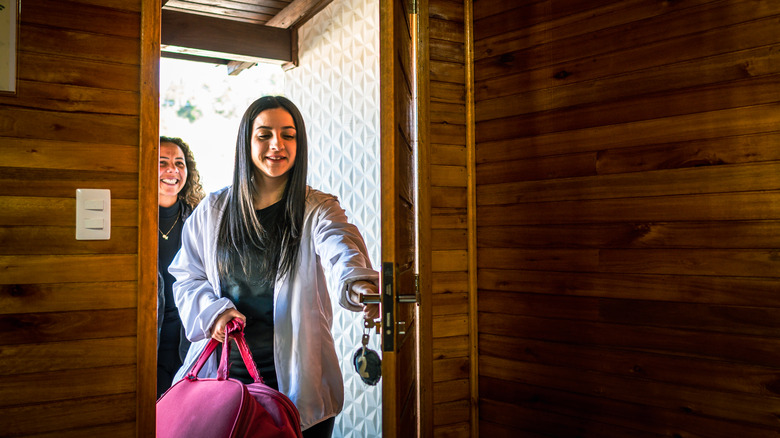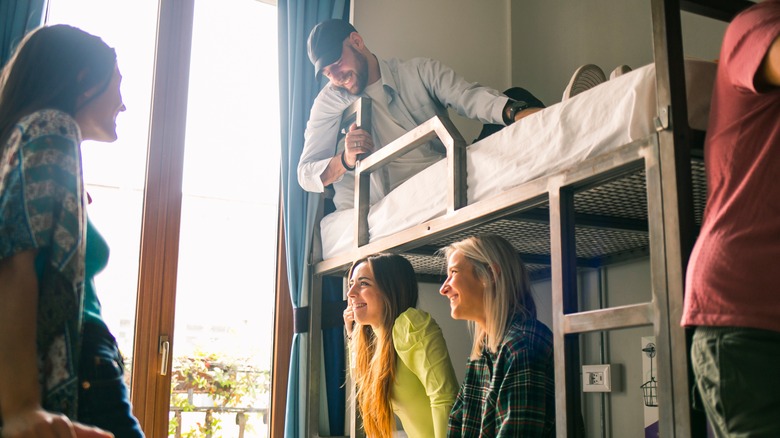The Hostel Red Flags You Should Avoid When Traveling
Staying in a hostel is a budget-friendly way to travel. Solo travelers and backpackers tend to frequent such places and are probably the first demographic you think of when considering a hostel. They can be a great way to make new friends, gather information about the cities and towns you're visiting, and get suggestions for finding tours to take and museums to visit. Figuring out where to stay can be simple through sites such as HostelWorld or Tripadvisor. However, booking with caution and listening to your gut are key components when staying in a hostel. Your safety should be a priority.
While they're not known for comfort, hostels shouldn't feel sketchy. If a hostel does feel sketchy, it's best to leave and find a new spot to book. For those of you new to this venture, learning the red flags to look out for can be the difference between a delightful stay and an anxiety-inducing one.
Finding a hostel
Before you book your hostel, look at reviews and do your research on the spots you're considering. You can search hashtags on TikTok and YouTube to find videos and visuals of the place you want to stay. Check out the cancellation policy as well. You might get to the place expecting one thing, and find that the hostel isn't what you imagined. Having the option to cancel and get a refund is a safeguard.
During your research, make a list of nonnegotiables and keep them in mind as you search. For example, are you okay with unisex lodging? Do you prefer private or communal restrooms? Do you want a restaurant in the hostel? Once you've done this, don't forget to check for the public transportation options. If there aren't any nearby, ask yourself if you want to be relying on Ubers, Lyfts, and taxi rides. Having more transportation options can also help you feel safer and less isolated throughout your stay.
Listen to your gut
Once you've found a spot and are ready to venture out, be sure to pick up a padlock for your things. Unless you specifically booked a private room, you'll likely be sharing a space with others, so this extra precaution can protect your belongings from being stolen. A portable charger is another important item to bring; you never know if all the outlets will be in use.
Once you arrive, take note of your surroundings. Do you feel safe? Do you feel comfortable in the neighborhood? If not, listen to your gut and try to find somewhere else to stay. As Business Insider points out, if the hostel is at a different address than what it said online, consider that a glaring red flag. The business might be a scam.
Next, pay attention to the customer service. They should not adamantly insist that you use specific services (i.e., tours or future stays through a specific agency) even after you've made it clear you're not interested. They should also not make inappropriate comments, and they shouldn't charge you more than the cost you planned for beforehand. If they do any of these things, it's best to leave. These indicators show that they have interests that do not include your safety.
Manage and protect your belongings
If your experience checking in is amicable, you're one step closer to having an enjoyable stay. Before you get too comfortable though, head up to your room and check for locks on the door and privacy in the bathrooms. If the showers don't have doors or curtains, or your room's door doesn't have a lock, consider these a red flag. While nobody expects complete privacy at a hostel, there should not be unnecessary exposure.
Keeping your belongings safe is another important matter to consider when booking a hostel. Looking for places that have storage lockers can help you do that. Some places have padlocks available for rent, but it's best to be prepared and bring your own. Other tips for keeping your items out of grasp from your neighbors include staying discreet when it comes to important items, hiding your belongings as best you can, and sleeping with your most valuable possessions under your pillow.
Take a look around before settling in
Another major red flag is bugs, especially bed bugs. If you hear rumors or read reviews that hint at or explicitly say they are at the hostel, book somewhere else. In addition to bugs, consider cleanliness. It's awful to see photos of a pristine environment only to realize the place is dirty upon arrival.
In addition to minding cleanliness levels and bugs, think about foot fungus (i.e., athlete's foot). Since there are constantly new people checking in and checking out of a single shared space, bacteria and gems can break out. While you can't necessarily prepare for this, you can check the cleaning process of the general areas to ensure the hostel is doing what it can to keep things clean. Upon arrival, take a peek. Check your sheets and mattress and always wear some kind of shoes.
With that being said, it's important to be mindful of your own cleanliness levels. There's no room service, so if you're hanging out in the common area, using the hostel's kitchen, or getting ready in the bathroom, clean up any mess you may leave.
Creating a memorable experience
While there are plenty of measures you can take to increase the likelihood of a positive hostel experience, there aren't any guarantees. Having backups in mind is a good idea, whether that be a different hostel or even a hotel. Like we've said before, keeping yourself safe while staying at a hostel is a must. If you have to cancel at one hostel and go over budget to stay at another, it's worth it.
One thing that you can control is how you behave in a hostel. The last thing you want to do is become a red flag for other guests by being inconsiderate and rude. Some key tips for hostel etiquette include watching your noise levels, especially late at night; using a phone flashlight instead of turning the lights on if you need to find something in the early hours of the morning; and packing the evening before if you have an early flight.
Another key thing to consider when staying at a hostel is the social element. You might meet your next best friend during your visit. Being open to connection and friendship can make your trip all the more memorable.





